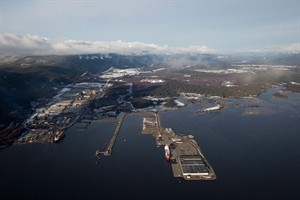
Douglas Channel, the proposed termination point for an oil pipeline in the Enbridge Northern Gateway Project, is pictured in an aerial view in Kitimat, B.C., on Tuesday January 10, 2012. THE CANADIAN PRESS/Darryl Dyck
December 19, 2013 - 3:40 PM
OTTAWA - The difference in Joe Oliver's language could not be more stark.
The federal Natural Resources minister issued an anodyne statement Thursday upon the release of the National Energy Board assessment of the proposed Northern Gateway pipeline, praising their work and promising more consultations.
"The panel's report represents a rigorous, open and comprehensive science-based assessment," Oliver said of the study, which approved the Encana project subject to 209 conditions.
"Now that we have received the report, we will thoroughly review it, consult with affected aboriginal groups and then make our decision. We also encourage everyone with an interest to take the time and review the report."
Compare that with Jan. 9, 2012, when Oliver issued an incendiary letter that framed getting Alberta bitumen to Asia-Pacific markets as nothing less than "an urgent matter of Canada's national interest."
All those opposed to projects like the $6-billion Northern Gateway were portrayed as foreign-funded "radicals" out to "hijack our regulatory system to achieve their radical ideological agenda" by shutting down every resource industry in the land, Oliver fumed at the time.
Even Conservative insiders subsequently conceded the government's over-the-top language served to paint a huge bull's-eye on the pipeline project and offend fence-sitting First Nations and environmentally friendly Canadians alike.
And so it was Thursday that, despite the pipeline being approved in principle, the Harper government kept its powder dry — recognizing that tough slogging is still to come and it's going to require finesse, not Foghorn Leghorn.
By imposing 209 conditions on the 1,200-kilometre pipeline route from Bruderheim, Alta., to Kitimat, B.C., the National Energy Board has set up 209 new pressure points for action by pipeline opponents.
Some First Nations will also likely make legal arguments that they were not properly consulted, as in its haste the government folded constitutionally mandated talks into the environmental review process.
"The real risk is not regulatory rejection but regulatory approval, undermined by subsequent legal challenges and the absence of 'social licence' to operate," Jim Prentice, the CIBC executive and former Harper environment minister, wrote in June 2012.
Prentice, in an interview, sounded more optimistic Thursday.
The NEB report buttresses two other recent developments: recommendations from a federal marine panel geared to upgrading tanker safety; and a report from federal envoy Doug Eyford that hit hard on the need for Ottawa to consult fully with First Nations.
"At this point, framed by this report, the most meaningful discussions are going to take place," Prentice predicted.
"I'll leave aside Mr. Oliver's earlier comments, but I think it is fair to say the government has applied itself pretty directly over the last six months."
Too late, say the government's critics.
"The idea of just ramming this thing through and insulting people to get it done was about the dumbest strategy I've ever seen," New Democrat MP Nathan Cullen, whose riding includes the proposed pipeline's terminus, said in an interview.
"The fact that they're toning it down only makes sense."
His party leader, Tom Mulcair, had already panned the pipeline proposal and the Conservative handling of the matter a day before the report was even released.
"You need social adhesion, you need to work with people. You can't just bark at them and say, 'This is going through,'" Mulcair said Wednesday.
"This is the Conservative way and, by the way, that's why Northern Gateway is never going to get built."
Geoff Regan, the Liberal natural resources critic, urged the government to deny approval Thursday but said there's no prospect of that happening.
"Mr. Harper has spent the past few years trying to ram the Northern Gateway project through at any cost," said Regan.
"They've antagonized civil society, they've weakened our environmental protections, they've politicized the environmental review system," Regan charged, claiming the oversight system has been "gamed."
Green party Leader Elizabeth May issued a statement saying the project's "large-scale risks need to be weighed against the economic reality that the benefits are to multinationals and other countries' refineries."
But public opinion on the matter appears much more nuanced. A national Harris-Decima poll last month found an overwhelming majority of Canadians see the oil and gas industry as the country's most important economic sector — even if the raw economic data doesn't support this perception.
A single federal department, Natural Resources Canada, will spend $40 million at home and abroad this fiscal year advertising Canada's "responsible" extraction of resources, principally oil and gas.
That campaign follows years of heavy advertising by the Canadian Association of Petroleum Producers and various oil companies.
The Harris-Decima survey in mid-November found that a majority of respondents, 51 per cent, supported the Northern Gateway proposal nationally, with 37 per cent opposed.
However those numbers were almost reversed in B.C., where the poll found 50 per cent opposed and 42 per cent favour.
It's worth noting too that Harris-Decima found 76 per cent of self-identified Conservatives supported the pipeline, far higher than the national average.
So there would appear to be pipeline support in the country, if only the government can finesse it through to completion.
Burying the bombast of 2012 appears to be the first step.
Prime Minister Stephen Harper, in a year-end interview Thursday with PostMedia, emphasized consultations with First Nations and the role of scientific evaluations in the Gateway project.
"But on this or any other like project ... the government favours resource development — obviously responsible resource development — but we will only proceed on individual projects on the basis of the advice we have and receive," said the prime minister.
There was no talk of radicals or urgent national interests.
News from © The Canadian Press, 2013